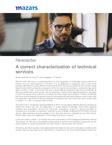
A correct characterization of technical services
With the entry into force of unrestricted terms for the registration of technology import contracts (6 months if it is an initial contract or 3 months if it is an addendum or extension) and in view of the practical difficulties to comply with the requirements within the terms provided by law (review of legal departments of both companies, language in which it is signed, among others), uncertainty has arisen again whether, in fact, all services that have a technological component should be considered as technical and therefore must comply with the registration requirement to take the deduction, language in which it is signed, among others), uncertainty has arisen again as to whether, in effect, all services that have a technological component must be considered technical and therefore must comply with the registration requirement to take the deduction (cost/expense) in the income tax return, as provided in Article 1. 2.1.18.17 of Decree 1625 of 2016.
The same Dian in its doctrine (concept 059443 of 2016, among others) defines technical services as "those that require the use and application of certain special knowledge, which allow applying methods and procedures, carrying out follow-ups, evaluations, analysis or issuing concepts or conclusions on a situation or a process", while the Council of State in judgment 14124 of 2014 (among others), differentiating technical assistance from technical services, indicated among other things, that the latter require the application of technology directly by an expert.
In the same sense, Article 1 of Decision 84 of the Commission of the Cartagena Agreement, defined "technology" as "the set of knowledge indispensable to perform the operations necessary for the transformation of inputs into products, the use of these or the provision of a service".
Therefore, technical services imply specialized knowledge on the part of the person rendering the service, that is to say that human intervention is inherent to it; the use of technological means; the application of methods and procedures from which follow-ups are carried out and conclusions are obtained; all, without there being a transfer of knowledge.
Consequently, not by the mere fact that a service is provided through technological means (internet, for example) it can be classified as a technical service to the extent that it does not require human action directly, with which services such as cloud storage, hosting services or automatic software updates, are not within the framework of a technical service, as stated by the Entity, without making a distinction between a service that, even if it has a technological component, it is an automatic system that does not require human action.
Therefore, the deductibility of the payments made abroad for technical services rendered in or from abroad, shall be subject -among other things such as practicing in due form the withholding at source-, to the registration of the contract within a term of 6 months from the execution of the contract or 3 months in case of making modifications to the original contract (article 123 of the Tax Statute), provided that the technical service is classified as such to the extent that the rendering of the service complies with the aforementioned requirements, highlighting the direct performance of the contractor in order to determine whether we are in the framework of a technical service contract or on the contrary it is "another service" whose deductibility requirements are not subject to the registration of the contract.


